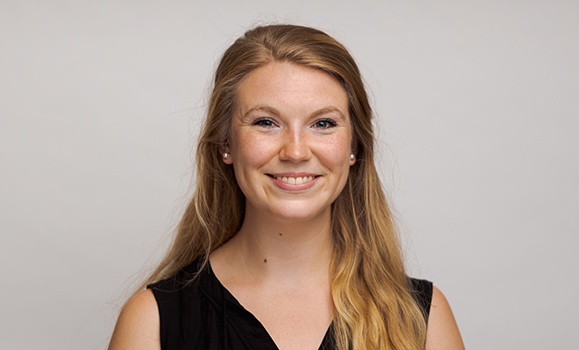This article is part of a series focusing on the grads of the Dalhousie Class of 2025. Spring Convocation takes place May 30 and from June 9-19 in Halifax and Truro. Read all our profiles┬аhere in one place┬аas they are published.
For as long as Dr. Katherine Houser can recall, she knew she wanted to work in health care.
Growing up in Moncton, New Brunswick she heard stories of her motherтАЩs compassion and dedication to nursing and was captivated by the idea of making a difference, dreaming of the day she could follow in her motherтАЩs footsteps.
When she faced an unsuccessful application to medical school, she pursued a Master of Applied Health Services Research. She was hired as a community developer with Horizon Health Network, a job that married her passion for health promotion and a person-centered approach to care, with her love for human connection. In this position, she collaborated with local community members and organizations to improve health outcomes and enhance the community's wellbeing through engagement and empowerment.
тАЬI remember reflecting on how fulfilling this work was and questioned whether medicine was still in the cards for me,тАЭ she recalls. тАЬI could see myself thriving in the world of population health work.тАЭ
Over time, she gained a deeper understanding of the systemic obstacles to change and recognized the significant impact that a physician's voice can have in health advocacy and systems reform. That realization was the spark that brought her back to her dream of becoming a doctor.
Now, as she embarks on her residency in family medicine in her hometown of Moncton тАФ the very community she hopes to serve long-term тАФ Dr. Houser is poised to make that dream a reality.
The power of connection
What drew Katherine to family medicine was the same spirit that guided her in community development: a love for human connection.
тАЬI love getting to know people and making them feel heard and safe,тАЭ she says. тАЬI want to be that trusted person my patients can go to with any and every question or concern.тАЭ┬а┬а
I love getting to know people and making them feel heard and safe
Family medicine also reflects her strong commitment to health promotion and disease prevention, as well as her drive to empower patients and families to make informed choices about their health and wellbeing. SheтАЩs drawn to the wide range of patient concerns and the complexity of care, which keeps each day dynamic and fulfilling. She values being a connector тАФ helping patients navigate the system, access resources, and feel truly heard and supported, particularly those from equity-deserving communities.
тАЬI like being in a position to support a patient with any concern they have when they walk through the door,тАЭ she says. тАЬIf IтАЩm not able to help them with their presenting concern, I will do my best to connect them with the appropriate resources.тАЭ
Leadership and service
This will not be the first time she will be in a position of support and connection. During her time at Dalhousie Medicine New Brunswick (DMNB), Dr. Houser distinguished herself through leadership and service. She supported peers as the Community-Engaged Service Learning NB rep, and as a Convocation representative, she helped celebrate their collective accomplishments.
She developed a fourth-year Leadership in Medicine elective to enhance her skills and strengthen her commitment to advocacy and the study of health systems. Working with the New Brunswick Medical Society, she gained insight into health-care policy and system reform, particularly the issues caused by poor communication among stakeholders, something she hopes to tackle with her research on interprofessional collaboration.
During medical school, Dr. Houser was also part of the Student Diversity and Inclusion Committee, hoping to contribute meaningfully to conversations around equity and representation. Engaging with peers, staff, and faculty who brought lived experiences and insights into systemic injustice, she began to see how institutional structures тАФ often invisible to those they benefit тАФ can create significant barriers for others.
тАЬIt really deepened that recognition of the privilege that comes with being a physician. ItтАЩs so important to use that influence to point fingers at systemic barriers that perpetuate health inequities and seek solutions for how the system can better meet the needs of others, rather than expecting others to adapt to a flawed, inequitable system.тАЭ┬а
Leading from within
Dr. Houser remains steadfast to the kind of physician she wants to be and the impact she hopes to have in helping address the current beleagured state of the primary care system in New Brunswick, which faces an aging and growing population, long wait times, poor access, staff shortages, and an outdated care model.┬а
She plans to work in a community family medicine practice, leaning into her strengths and interests to address the priorities in the community she serves. She envisions a clinic that prioritizes culturally safe care, offers gender-affirming services, and supports patients navigating complex social circumstances.
тАЬMy ability to form trusted connections and support a patient-centred experience aligns with my vision to make my patients feel seen, heard, safe, valued and supported to be their authentic selves,тАЭ she says. тАЬI think this is especially important when caring for equity deserving groups, like women and the 2SLGBTQIA+ community.тАЭ┬а
She wants to build systems that donтАЩt just respond to inequities but actively dismantle them. Family medicine gives her the breadth to pursue that vision: to care for diverse communities, to lead from within, and to keep learning from the people she serves.

